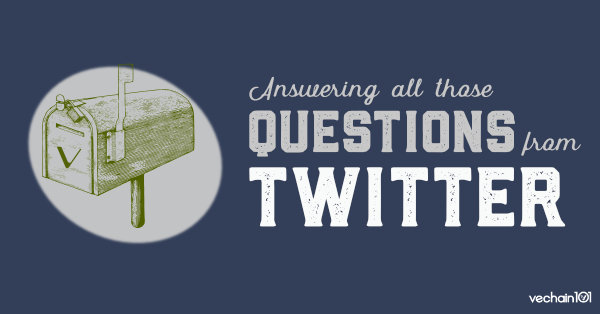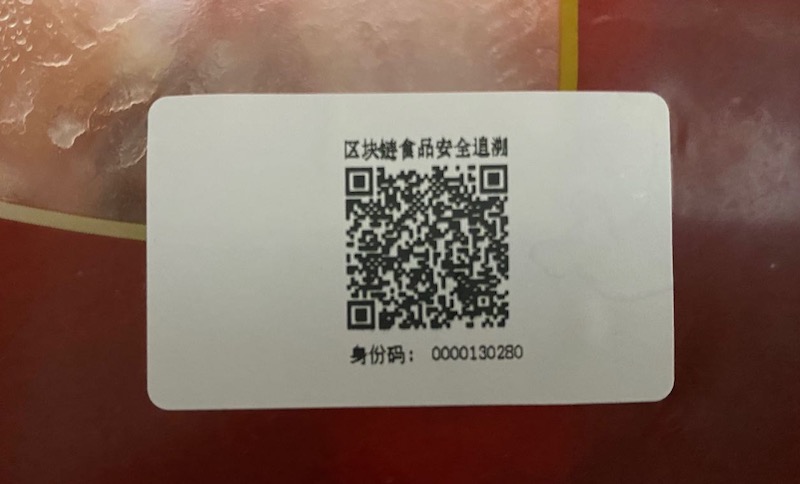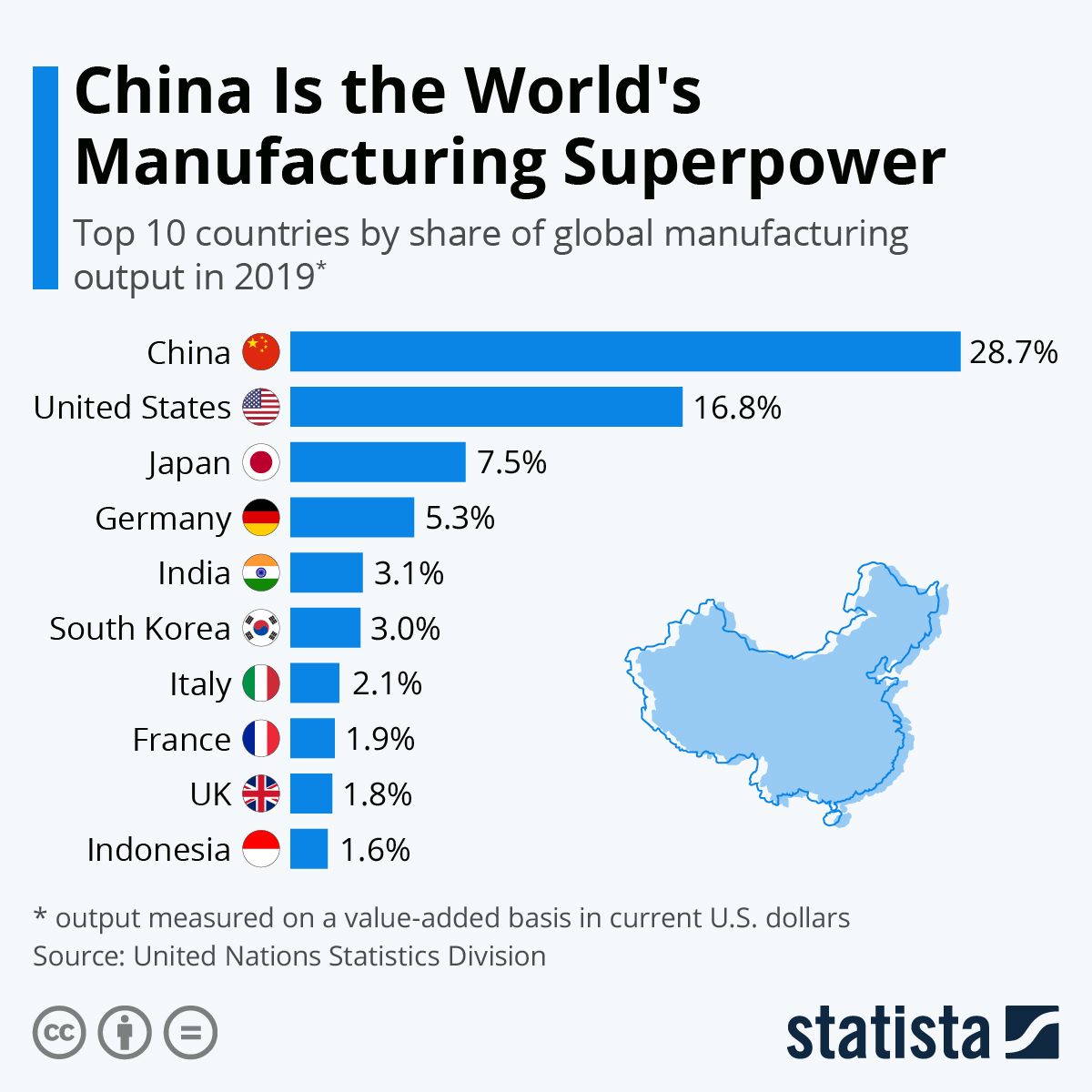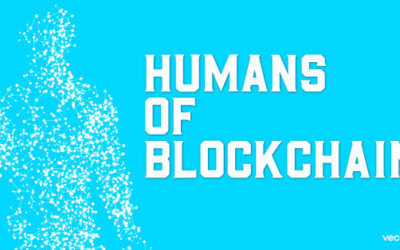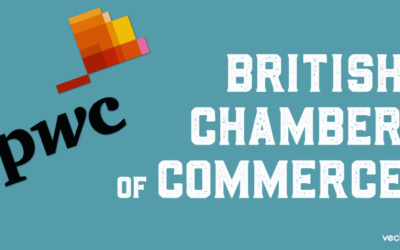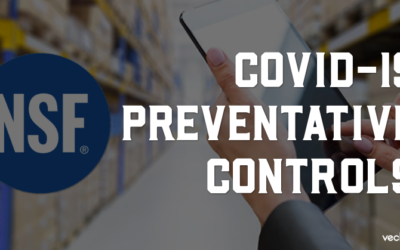Last week we shared photos and insights from Sam’s Club showing VeChain integration on a section of chicken. This created a pretty hearty reaction on social media, with lots of questions and comments. Rather than address them one by one, we decided to make a mega-thread here.
Great article!
Question for you Ben – were the codes on each packet of Chicken in that freezer the same? What I’m trying to understand, is whether each individual item is tracked or is it done by a batch at a time? — Nashe (@ef_2104) June 4, 2020
Thanks, Nashe. As you may have seen from the sticker below, there is a 10 digit code underneath the QR code. This “ID Code” (身份吗) is unique on each product, and each one links to a different transaction. I wish I would have documented that better, next time I’m back there I’ll try to show that off. It’s also interesting that they chose such a long code – I guess they plan on making a lot of these.
I don’t see a @TysonBrand logo anywhere. It looks like they’re working with a generic label @SamsClub processing plant who gets chicken from Tyson.
This is still pretty cool though. The best #blockchain supply chain stuff that I’ve seen working in real life. — JESSE ℂOUℂℍ (@jessecouch) June 6, 2020
Well Jesse – while I share your enthusiasm, I guess Chinese isn’t a native language of yours. The logo below is the official Tyson Foods logo in Chinese. Pronounced Tài Sēn, this chicken company shares a Chinese name with a famous boxer. Here’s their official website if you feel like a second opinion.
i mean this is great, but until we see adoption outside of stores china, then ill get excited.
— σ ɱ ȥ🔻ギんシ ♥ ₿ (@oj89_) June 4, 2020
Hmm.. while I understand your desire to expand rapidly, I think you are overlooking the scale of things here. Besides having 1/5th the world’s population, most of what people buy in stores around the world comes from China. So for a supply chain tool like ToolChain, I’d be worried if they weren’t showing major traction here. After all, more than 1 in 4 things made in the world are made in China. Alibaba is one of the largest internet companies in the world and they service China nearly exclusively. And that’s not to say VeChain isn’t being seen outside of China – take a look at what DNV GL is doing with Italian wines and canned foods. Also check out the Webinar Jason Rockwood did with Producers Market, a company with a growing presence worldwide.
Finally solving the chicken verification problem!!
— WindowLinker (@windowlinker) June 5, 2020
While I suspect WindowLinker may be trolling with that screen name, I like that this was brought up. The problem isn’t verifying the chicken, the problem is that people want to have more data about what they are eating. This creates accountability in the product, as it’s no longer just a pallet of meat that showed up in the loading dock. With this QR code, everyone can see the path from Shandong (the farm) to where it was sold, as well as the ID of the worker responsible for processing this. The accountability isn’t just for the consumer though – it’s Sam’s Club holding its third-party suppliers accountable, and the third-party suppliers holding Sam’s Club accountable (Don’t sell our meat after expiration!). The reward for consumers is obvious, but Sam’s Club gets known as a trusted retailer, while the supplier benefits from the Members Mark labels and preferred branding around the store. Everyone wins, except those companies that try to bundle their overpriced consulting services with a private blockchain and charge a fortune for it!
Cool, but those qr code stickers are so low budget
— Jason Laczkovics (@Lacko_party_pak) June 4, 2020
You know that old saying… it’s not a bug, it’s a feature. If a company needs to slap stickers on hundreds of thousands of products, they don’t want to spend hundreds of thousands of dollars on fancy tags. This is no different from a standard price tag on any other product – it’s fast, cheap, and effective, while not distracting from the packaging. The idea that blockchain can add transparency without costing an arm and a leg is very important. Especially for produce and food, where the total cost of the product might not be very high to begin with, as compared to a luxury bag or imported bottle of wine. And in any event, it’s not like the technology bottleneck is about designing fancy stickers.
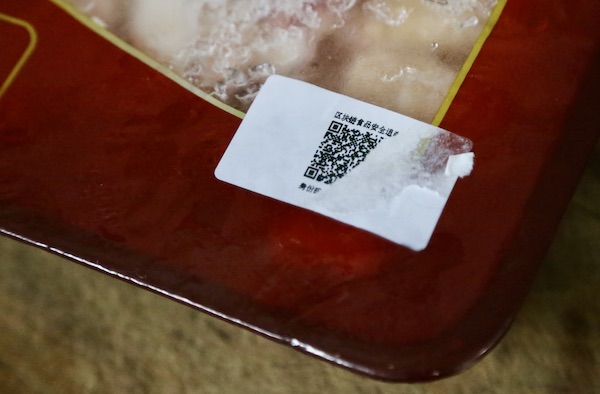
Any idea if this will show whether the chicken as been cleaned in ammonia or not? @SamsClub — jontask 🏴🇨🇦 (@jontask1) June 7, 2020
At the moment, it doesn’t. But there’s no reason why it couldn’t. That’s something that I’m sure My Story and DNV GL will be looking at. This is an example of how every use case can fit the business need: Chinese shoppers aren’t as focused on details like that, whereas place of origin, date processed, and manufacturer is more important to them. It’s a great use case though.
Excuse me. How can they provide the products journey within the supply chain (Tyson’s) if they are not working with them?
— ⓧRPlusⓋET (@fredostat) June 6, 2020
Easy! VeChain creates the infrastructure (ToolChain) which they then share with channel partners and consultants. The consultants push it to clients like Walmart China & Sam’s Club China who then sign a contract, white-label the technology to match their needs and branding, and then issue directives to suppliers and manufacturers on how to use it. Partners pay the consultant a big fee and buy ToolChain Credits from VeChain. Each product ID or data upload burns VTHO and contributes to the rising mainnet traffic. But suppliers at the end of this ‘chain’ won’t necessarily have to deal directly with VeChain, or understand how the blockchain works. That’s the beauty of working with a top enterprise blockchain protocol with fee delegation.
Note: I saw some people get a little overboard on the Tyson & VeChain partnership hype. First of all, this is Tyson China, which is a subsidiary, so nothing to do (currently and that I know of) with the North American producers and supply chains. Second, this is the Sam’s Club Traceability program, so Tyson China would only be doing it for products that get sold in Sam’s Club stores. As a major B2B buyer, companies like Walmart and Sam’s Club can set standards for their suppliers. If the suppliers want these major retailers as a client (spoiler: they do), they will comply. Twitter user @BitStreetSheep got this right when he said:
#SamsClub says to #Tyson, “Hey, we want to continue to buy and carry your product, but moving forward, we need you to roll with the punches and include all this other information about it, by means of this new app (ToolChain). Tyson agrees, though they may not know about $VET
— Sheep Ⓥf ₿it Street (@BitStreetSheep) June 6, 2020
Well, mostly right. I would say it’s more of a “Hey, we can include your chicken wings as part of our Member’s Mark guaranteed products with special branding and placement throughout the stores (retail & online) if you are willing to provide more complete data with your products.” It’s more of an opportunity than a threat.
That’s it for now. If you have anymore questions, feel free to find us on Twitter @KouTseng or @benyorke.

